#studies
Could Minivans Become Popular Again?
While often derided as highly unfashionable, minivans really are the Swiss Army knife of vehicles. They’re people haulers, cargo carriers, mobile campsites, and can even improvise as work vehicles for when a utility van (the Leatherman of vehicles) is unavailable. Minivans also drive more like cars than the brutes occupying the SUV and pickup segment, making them easier for some drivers to live with.
With vans having enjoyed a cultural renaissance during the 1970s, minivans hit the ground running in the mid-1980s and continued to swell in popularity until the millennium. By then, North Americans were buying an estimated 1.5 million minivans a year. But that’s also where society decided to apply the brakes. Sport utility vehicles and crossovers have effectively supplanted the van as the default family conveyance — though recent sales figures have suggested those dying flames are now being rekindled.
Survey Suggests Americans Still Doubt EVs [UPDATED]
While plug-in vehicles are catching on in Europe, representing 21 percent of all new registrations in the first quarter of 2022, they’ve been less popular in the United States. Only about 5.2 percent of American registrations were of the plug-in variety (representing hybrid and purely electric vehicles) during the same timeframe. Despite the industry spending billions to develop and market these vehicles, with some progress being made, the overall take rate within North America remains underwhelming.
Ardent fans of battery based powertrains will undoubtedly disagree. But a couple of studies came out this month that drove the point home. Autolist’s Annual Electric Survey dropped earlier this month, effectively outlining why EVs haven’t been able to make more headway in the states.
Average Age of U.S. Light Vehicles Older Than Ever
S&P Global Mobility has reported that the average U.S. automobile is now 12.2 years old, which it said represented a 2 percent increase since 2021. While relatively modest, the general trend for the last five years has been for vehicles to get older as drivers attempted to milk more life from beleaguered hardware.
Much of this has been attributed to North America’s broadening wealth gap and general improvements in vehicle longevity. If you look back at Department of Transportation data from the 1990s, the average age of a car was under nine years. By 2007, the typical car would see its 10th birthday before scrappage and the number has continued to climb from there. Much of that is due to households having to make do with tighter budgets, which was arguably made easier by modern powertrains that can easily exceed 100,000 miles before needing any serious maintenance.
Why Are Traffic Deaths Increasing While People Are Driving Less?
The latest data from the National Highway Traffic Safety Administration (NHTSA) is confirming what local agencies have already been suggesting. Last year represented another sizable increase in U.S. roadway fatalities, pitching up by 10.5 percent over the elevated death rate witnessed in 2020. The agency has estimated that 42,915 people were killed in 2021, whereas 2020 resulted in 38,824 fatalities — a 7.1-percent increase over the declines seen in 2019. While the current situation is not nearly as bad as the rates witnessed during the 1970s, this still represents the highest per capita fatalities in sixteen years and everyone is trying to get a handle on why.
Traffic deaths have been on the rise since the start of the pandemic, confusing everyone who counts crashes because the supporting data also shows that there was a lot less driving being done during the period. Historically, years where people are disinclined from hitting the road due to a beleaguered economy tend to represent far fewer traffic-related fatalities. We can see this happening in 1942 when the U.S. braced itself to enter World War II by rationing everything from fuel to rubber. Another glaring example takes place in 1932, as the nation reached the darkest point in the Great Depression. In fact, there are very few examples of per capita improvements in on-road deaths from the pre-war period, and those that do exist coincide directly with economic recession.
Toyota to Study Advanced Driving System Interactions
Toyota will be launching nine new studies over the next five years to improve automotive safety, specifically in relation to how drivers engage with advanced driving aids equipped to modern vehicles. While the press release to a back seat to the automaker receiving an award for hiring female engineers and a $400,000 donation to the National Environmental Education Foundation, it’s likely to have broader ramifications on the industry.
Despite launching a bevy of new assistance features over the past few years, manufacturers haven’t actually spent all that much time studying how they might impact the act of driving. Testing usually focuses on ensuring the system functions, with independent research being left to examine how electronic helpers might influence behavior from behind the wheel. Unfortunately, preliminary studies have suggested that they lull motorists into a false sense of security, potentially offsetting any legitimate safety advantages the relevant technologies provide.
IIHS Study Suggests Buyers of Used Vehicles Learn Less About Their Car
The Insurance Institute for Highway Safety (IIHS) is claiming that individuals shopping for a secondhand automobile end up learning less about the modern features lurking within their automobiles. Considering salespeople have meetings about how best to hype the advanced driving aids in new models, this one really shouldn’t have required a survey for the IIHS to piece it together. But the outlet appears to be attempting to link this alleged lack of knowledge to make claims that it’ll somehow contribute to the probably of used vehicles being involved in a crash.
“Used car buyers were substantially less likely than new car buyers to know about the advanced driver assistance features present on their vehicles,” stated IIHS Senior Research Scientist Ian Reagan, the author of the study. “They were also less likely to be able to describe how those features work, and they had less trust in them. That could translate into less frequent use, causing crash reductions from these systems to wane.”
Where Are People Waiting the Longest to Buy a New Car?
Nobody should envy car shoppers right now. With production shortages ongoing, there’s never anything you want on the lot, and what is there is likely to be grotesquely overpriced.
This has encouraged consumers to wait longer before replacing their current ride, which is statistically likely to be far older than years past. But not everyone has the same level of patience or financial wellbeing, meaning certain parts of the country are seeing longer intervals between cars than others. There are also regional inventory disparities to account for, encouraging analytics firm Growth from Knowledge (GfK) to conduct an investigation into which parts of the United States are waiting for the longest to procure a new automobile.
AAA Endorses Driver-Monitoring Camera Systems
Despite the automotive industry collectively promising to commence deliveries of self-driving cars in 2019, autonomous vehicles have remained test platforms for technologies that don’t yet seem ready for mass consumption. Public perception of the concept has also endured a few setbacks after several fatalities involving partially autonomous vehicles received national media attention. Today, the relevant technologies have failed to mature as swiftly as indicated and there are a whole host of legal ramifications to contend with.
Selling an automobile that’s marketed as being able to drive itself (even partially) are exposing automakers to a whole new demographic of lawsuits, so they’re desperate to install failsafe measures that places the onus of responsibility back onto the driver. Their current favorite is driver-monitoring cameras, which the American Automobile Association (AAA) likewise believes are probably the best solution. The outlet recently shared the results of a study attempting to determine which driver-engagement systems worked best and decided that in-cabin cameras were the leading choice in a batch of bad options.
Survey: Which EVs Are Leaving Drivers the Most Satisfied?
With electric vehicles getting a lot of press, you might be wondering which models are scratching consumers in all the right places.
According to J.D. Power’s U.S. Electric Vehicle Experience Ownership Study, the Kia Niro EV is the best thing the mainstream BEV market currently has to offer. The Korean model garnered a satisfaction rating of 744 points out of a possible 1,000. However, it wasn’t the top dog overall. That honor fell to the Tesla Model 3, which achieved a score of 777 points — besting the industry average for premium electrics by a whole seven points.
Are Electric or Combustion Cars Better at Weathering a Winter Storm?
Following the Virginia shutdown of Interstate 95 that left countless people stranded in freezing weather overnight earlier this month, there was a surprising amount of news coverage making offhand comments about how victims would have been better off if they all were driving electric vehicles (Ed. note — there was also this Washington Post op-ed in which the author worried that an EV would be a poor vehicle to be stranded in And this Vice rebuttal to that article). While it seemed an inopportune time to advertise for EVs, it’s an interesting premise and encouraged Car and Driver to conduct a head-to-head experiment between a Tesla Model 3 and Hyundai Sonata N-Line to see who could keep the cabin warm for the longest period of time when stranded.
Realistically, you’d be better off in whatever vehicle is yielding the heaviest fuel tank or least-depleted battery when traffic stops. But there are other factors to consider. Idling an internal-combustion car for extended periods of time is not recommended and doing so when totally snowed in could potentially trap harmful exhaust gasses if the exhaust is not kept clear. Meanwhile, EVs are notorious for having their battery chemistry altered by colder temperatures. This is especially true if they lack the relevant thermal management systems, resulting in the maximum range being diminished by as much as 30 percent.
Study Shows Auto Dealer Sentiment Still Ridiculously Positive
Car dealers have been polled for the fourth-quarter Cox Automotive Dealer Sentiment Index (CADSI) and they’re still incredibly optimistic, despite losing some of their earlier confidence that new-vehicle sales would be relatively healthy.
The dealer optimism – especially among franchised entities – seems to be wholly tied to profitability here. New vehicle sales dropped in 2019 and absolutely cratered in 2020 due to the nation’s response to the pandemic. In spite of there being plenty of talking heads in the news media telling you not to stress about the economy, inflation has created pricing increases across the board and automobiles are at the tippy top of that list. With inventories remaining relatively lean due to production slowdowns, staggering dealer markups have become the norm. Basically, stores just seem happy that they can charge more per car while they’re in short supply. But they’re also starting to have concerns about the long-term viability of the market and are are feeling the pinch of rising operating costs.
Study Suggests Time Plays Important Factor in Repair Costs for EVs Vs ICEs
Since the hottest news surrounding the automotive industry today happens to be rolling updates about supply shortages, factory downtime, and how it’s not impacting manufacturing profits as much as anticipated, I’ve been diving back into studies and research pertaining to the future of the automotive industry. It’s a little more enjoyable for my own gray matter to process and might provide readers with a touch more to ponder than another story about how automakers are stalling production because an insufficient number of doodads were placed on a boat that’s waiting off the California coastline.
Earlier this week, we examined research exploring how much electric vehicles actually cost to run and that theme will persist. There’s a new study suggesting EVs boast lower repair bills than gasoline-driven alternatives. But there’s an interesting tipping point that occurs early in a vehicle’s lifespan that makes it happen. Before that, it’s cheaper on average to maintain something equipped with an internal combustion engine.
Study: Automotive Debt Is Out of Control, You're Being Swindled
Consumer Reports just released the findings of a year-long stud y looking into the latest trends in automotive loans and car payments. The resulting information highlights just how explosive the debt growth has been over the last 10 years and the arbitrary way in which borrowers are now being treated.
Long story short, we’re all being swindled.
With vehicle prices ballooning and the associated loans becoming longer than ever, dealers and lenders seem to be operating whatever way yields the steepest profit margins with only a modicum of consideration being given to the established frameworks designed to act as a guard rail. This has led to U.S. citizens carrying around a record $1.37 trillion in automotive load debt and customers with good credit being treated no different than those that fall into the subprime category. Sadly, the issue appears only appears to be worsening as new economic perils are only making things more expensive. Meanwhile, data from the Federal Reserve Bank of New York is projecting national auto debt to swell to $1.42 trillion by year’s end.
Study: Do EVs Really Cost Less to Run Than Internal Combustion Cars?
With the volume having been turned down on just about every business sector imaginable, automakers have spent most of this year explaining how supply chain shortages are impacting production and making promises about electric vehicles. However, the rhetoric surrounding electrification has gotten so aggressive that it’s fast becoming another contentious issue, leading to vicious arguments as people square up to take sides. Part of this is due to the enterprising way in which zero-emission vehicles are being marketed and subsequently embraced by world leaders that don’t know jack about the manufacturing or the environment. Much of the discourse surrounding electrification (pro or con) lacks nuance and leads to businesses promising whatever they can in an effort to obtain your unquestioning belief.
For example, EVs are frequently promoted as boasting substantially lower operating costs due to there being no reliance on liquid fuel. Though finding the truth actually requires one to make a comparative analysis while taking into account how, where, and what you’re driving. There’s even a new study out from the Anderson Economic Group (AEG) attempting to determine the true savings of swapping to an EV where the researchers ultimately decided gasoline-powered cars were actually easier on the wallet. However, that likewise requires loads of clarifying context and conditional factors.
Rain or Shine: AAA Finds Out Advanced Driving Aids Still Suck
A new study from the American Automobile Association (AAA) has found that rain can severely impair advanced driver-assistance systems (ADAS). Similar to how highway traffic slows to a crawl when there’s a sudden deluge, modern safety equipment can have real trouble performing when a drizzle becomes a downpour.
On Thursday, the motor club organization released findings from closed-course testing that appeared to indicate some assistance suites had real trouble seeing through bad weather. AAA reported that 33 percent of test vehicles equipped with automatic emergency braking traveling collided with a stopped car when exposed to simulated rainfall at 35 mph. The numbers for automatic lane-keeping was worse, with 69 percent drifting outside the lines. Considering the number of times the people writing for this website have anecdotally criticized ADAS for misbehaving in snow, sleet, rain, fog, or just from an automobile being a little too dirty, it’s hard not to feel a little vindicated.



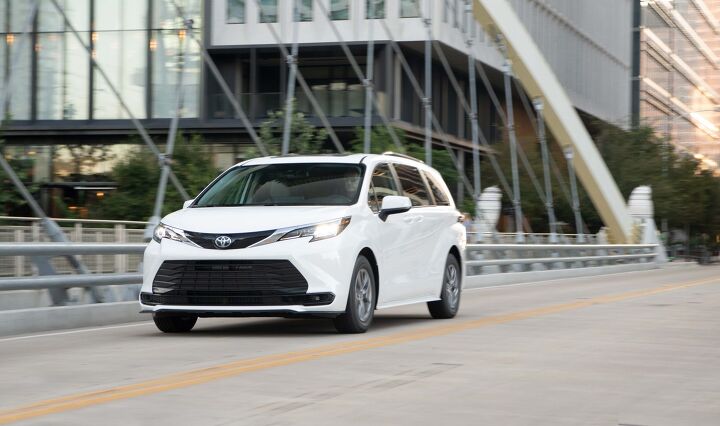
![Survey Suggests Americans Still Doubt EVs [UPDATED]](https://cdn-fastly.thetruthaboutcars.com/media/2022/07/19/9146893/new-york-to-ban-sale-of-gasoline-vehicles-after-2035.jpg?size=720x845&nocrop=1)

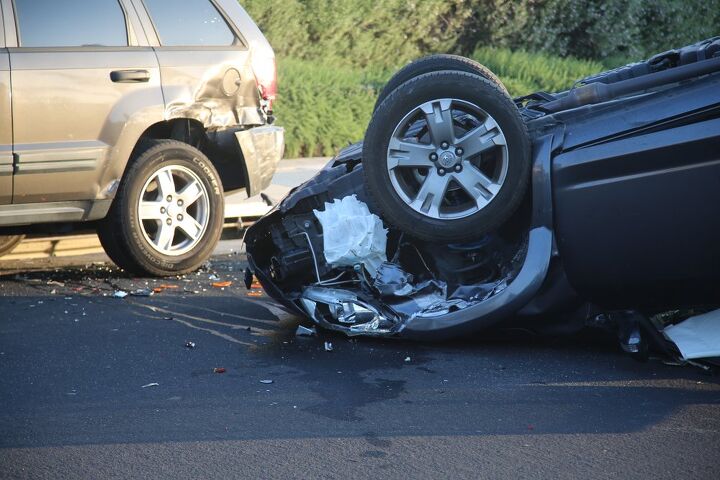



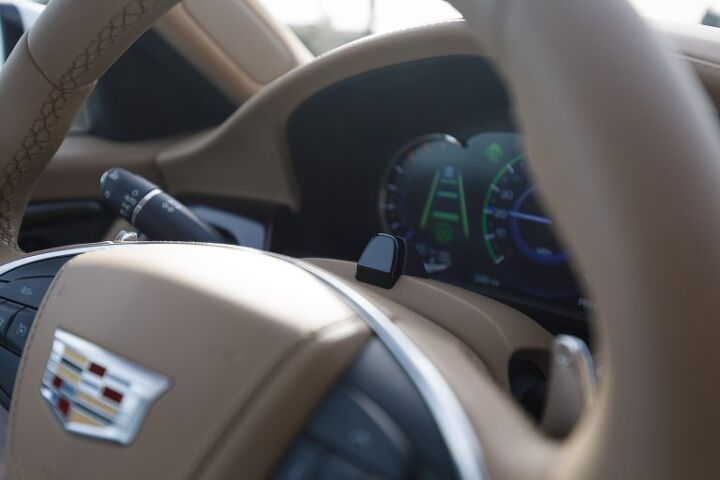



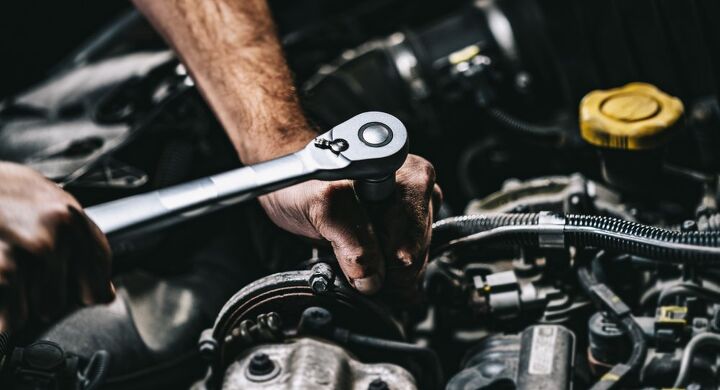

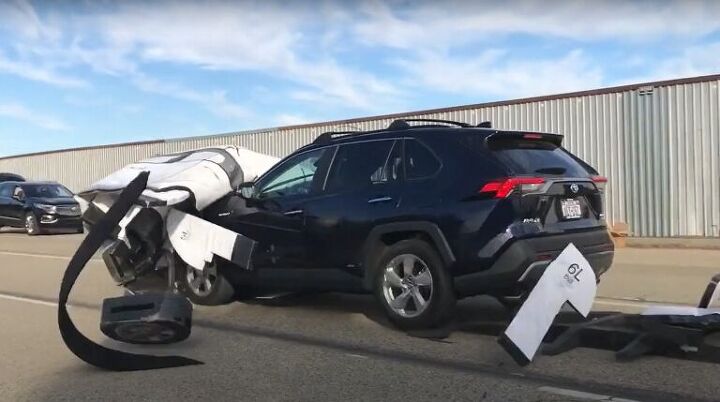












Recent Comments